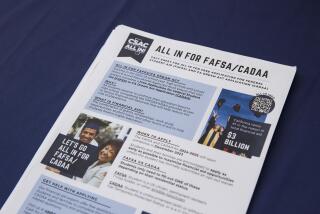Loan Fund Set Up to Help Aliens With Fees
- Share via
In an effort to help low-income aliens apply for amnesty, a group of foundations is setting up a novel loan fund that is expected to enable several thousand immigrant families to enroll in the legalization program, it was announced Friday.
“Many Southern Californians who are eligible for amnesty could miss out on this once-in-a-lifetime opportunity to become legal residents simply because they may not be able to draw upon large saving accounts . . . to apply,” said Ignacio Lozano Jr., editor-in-chief of La Opinion, at a press conference Friday.
Lozano made the announcement as a member of the board of the California Community Foundation. The foundation, along with the James Irvine Foundation and the Conrad N. Hilton Foundation, are each donating $500,000 to the program.
Hoping for More
Foundation spokesmen said they hope the “Fund for New Americans,” as the loan program is called, will grow by another $2 million in donations from other sources. They said they hope the fund will help at least 3,000 families.
The new program will not necessarily meet all application costs, which might reach $1,000 in particularly complicated cases, the foundation spokesmen said. But it will offer immigrant families loans of $410 each, to be paid back in monthly installments of about $20, including 10% interest, over two years.
Blas Fernandez, a recent high school graduate, heard about the program when he went to the International Institute of Los Angeles, one of several local legalization processing centers, to ask about amnesty.
Handicapped Parents
“I don’t know how we would have gotten the money together for the fees,” said Fernandez, 18, one of seven children--four of whom were born in Mexico--of handicapped parents. “Whew! It would have been impossible!”
A major complaint from immigrants’ advocates is that many qualified applicants for amnesty cannot afford what can amount to $420 in government filing fees alone. Nonprofit organizations that help aliens through the legalization process also charge for their costs.
The program was welcomed by immigrants’ advocates, many of whom have been critical of the fact that the U.S. Immigration and Naturalization Service is charging amnesty fees at all. In many cases, immigrants have failed to return to complete amnesty applications because they did not have the filing fees, the advocates said.
Frank Acosta, director of the Downtown Legalization Project, which is a joint operation of the Asian Pacific American Legal Center and the United Methodist Church, said the program already has had an impact at his center since word of the loans got out two weeks ago.
“It’s been a flood ever since then,” he said. “The response has been incredible. I’m just really pleased with the program.”
“I’m sure it won’t meet all the needs but, absent canceling the fees, it should help a lot,” said Nativo Lopez, director of the Orange County chapter of the Center of Hermandad Mexicana Nacional. “It’s a good, honest effort.”
Jack Shakely, president of the California Community Foundation, said that starting Monday, immigrants may apply for the set $410 loan at any of the major amnesty processing centers. Security Pacific National Bank will process the loans, which will then be repaid to the bank in 24 monthly installments of $19.62. The repayment schedule includes a $15 bank processing fee and 10% interest.
Security Pacific said it reserves the right to deny loans to any applicant with a demonstrably bad credit history, but it will issue loans to applicants with no credit history and no Social Security numbers. Only families are eligible.
Up to $235 of the $410 loan will go directly to the U.S. Immigration and Naturalization Service to help defray the filing fees. The remaining $175 will cover fees charged by nonprofit legalization centers for processing applications.
More to Read
Sign up for Essential California
The most important California stories and recommendations in your inbox every morning.
You may occasionally receive promotional content from the Los Angeles Times.










